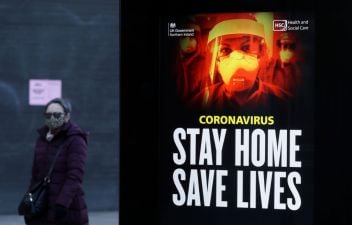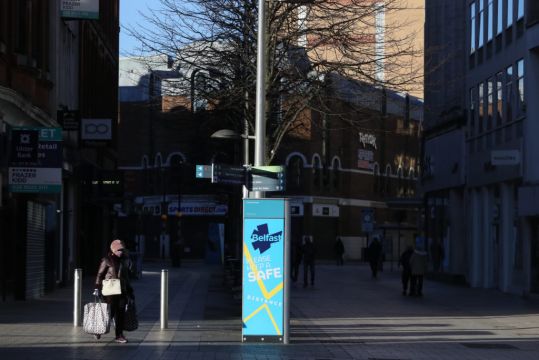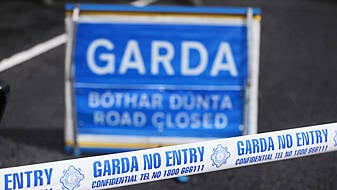Northern Ireland’s health chiefs have warned that the number of people with Covid-19 in hospital will double by the third week of January compared to the current figures.
The prediction was made in a joint statement by the chief executives of the region’s six health and social care trusts on Sunday.
It came as an alert was issued to staff at South West Acute Hospital in Enniskillen appealing for them to go directly to the hospital due to increasing pressures on the healthcare system regionally on Sunday night.
Attention all off-duty staff in the vicinity of SWAH. Due to increasing pressures this evening on the NI Healthcare System, we are appealing to you to contact or go directly to the hospital. Thank You pic.twitter.com/VLMvSg9g8X
— Western Trust (@WesternHSCTrust) January 10, 2021
Advertisement
South West Acute Hospital said: “Attention all off-duty staff in the vicinity of SWAH. Due to increasing pressures this evening on the NI Healthcare System, we are appealing to you to contact or go directly to the hospital. Thank You.”
The health chiefs said the surge in expected hospital admissions cannot be solved by creating more beds because the staff are not there to care for increased numbers of patients.
“The situation is very serious with modelling projections indicating that in the third week in January we will be trying to contend with double the number of Covid positive patients compared to the current position today, when several hospitals already have record numbers of patients,” the statement read.
“This is not a simple matter of putting up more beds. We need the staff to care for the increased number of patients.
“Pre-existing staffing pressures and staff absence because of Covid, and other reasons, mean that those staff simply aren’t there.”
The North’s health system has come under severe pressure since Christmas – hospitals are almost at full capacity and cancer surgery procedures were among the operations cancelled in Belfast.
Sunday saw a further 17 deaths due to Covid-19 and 1,112 additional positive cases in Northern Ireland.
It brings the total number of people who died of the virus to 1,460 and the total confirmed cases to 88,700 since the pandemic began.
There were 703 people with the virus in hospitals across Northern Ireland and 53 in intensive care units.
Hospital occupancy was at 94 per cent and there were 15 intensive care beds available.
The region’s seven-day incidence rate per 100,000 of the population stands at 556.
Newry, Mourne and Down had the highest rate at 801 per 100,000 population, followed by Mid Ulster at 751 and Armagh City, Banbridge and Craigavon at 722.
The health chiefs said several trusts had already had to stand down all but the most urgent elective surgery, including some red-flag cancer surgery, to redeploy staff to meet the urgent and immediate needs of extremely ill patients needing ICU care.
“These postponed operations will be rescheduled as soon as possible,” they said.
“We have established a regional approach to ensure that any available theatre capacity across Northern Ireland is allocated for those patients most in need of surgery, both during surge and as we come out of this surge.
“This may mean that patients will need to travel further for their surgery.
“Cancer services are seeking to maintain chemotherapy, radiotherapy and other non-surgical treatments and alternative treatments will be provided in the absence of surgical options.”
They added that healthcare staff would do everything they could do to deal with the unfolding situation, despite being “exhausted”.
“It will definitely not be easy and the care that we are able to provide will at times fall short of the high standards we normally deliver but we will do our very best,” they said.
“Desperately ill patients whether Covid or non-Covid will always be the ones being prioritised.”
The public have been urged not to attend emergency departments at any time unless they need emergency care.
“It is likely that those who do attend will wait longer to be seen and for admission to hospital if that is what they require,” the chiefs said.
“Patients arriving by ambulance will also wait at times, sometimes for many hours before space is available in an already over-stretched ED.”
They warned that when there is pressure in one part of the health and social care system “inevitably” it impacted on other parts.
“We might once again need families to be willing to fill unavoidable gaps in domiciliary care,” they said.
“Never has the phrase ‘all in it together’ been so pertinent and just so important.
“The Covid-19 vaccines provide the long-term hope and the current lockdown offers the opportunity to shorten the duration of the current surge,” they added.

They urged the public to continue to play their part by staying at home, practising social distancing and wearing face coverings.
New lockdown restrictions preventing people from leaving home except for essential reasons came into effect on Friday.
The strict rules will remain in place until February 6th but will be reviewed later this month.







